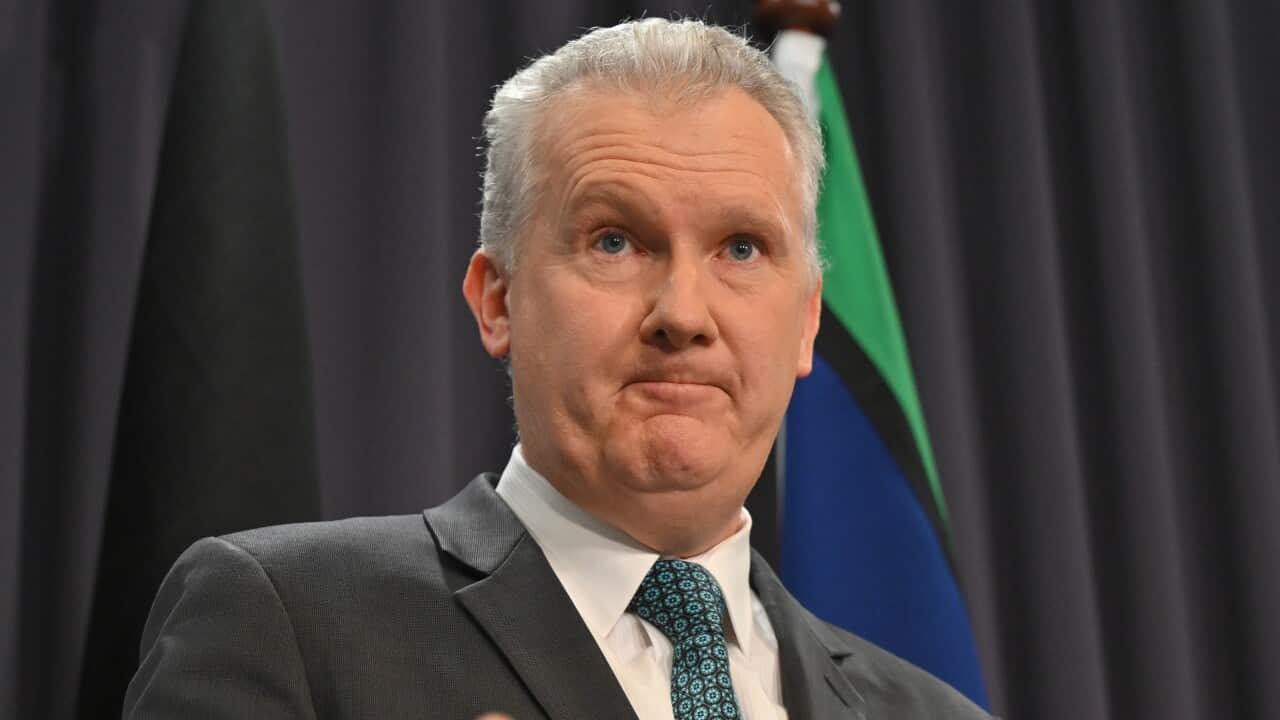Key Points
- Dozens of Australians are in Syrian detention camps for families linked to the self-proclaimed Islamic State group.
- Home Affairs Minister Tony Burke has said the government’s ability to help them is "severely limited".
- A former United States ambassador who has recently visited the area has criticised this position as a "feeble" excuse.
A former United States ambassador has criticised the government's "feeble" excuse for not providing more assistance to Australian women and children trapped in northeastern Syria.
Peter Galbraith has travelled to the Kurdish-controlled region twice in the past fortnight to help return two Yazidi children to their mother.
He says both the government and Opposition are exaggerating the danger of sending personnel to help
Home Affairs Minister Tony Burke said on Tuesday that: "The government’s ability to provide assistance to those in Syria is severely limited, due to the extremely dangerous security situation".
Burke also cited the absence of an Australian embassy or consulate in Syria.
Asked if he agreed with Burke's assessment, Galbraith said: "Absolutely not."
US would 'certainly assist' Australia
"Of course, it's not perfectly safe, but it's certainly a place that a diplomat can visit," Galbraith said.
"The United States [military] is there, and American diplomats are there.
"The United States would certainly assist Australian diplomats who went there," adding he expects the US would "bring Australians out" if asked.

Former US ambassador Peter Galbraith has said he was aware the return of Australian women and children still in the al-Roj detention camp could be politicised but believes the government and Opposition have exaggerated the potential security risks. Source: Getty / Vladimir Shtanko/Anadolu
"If Australia asks [the Kurds] for any of its citizens back, they will provide those citizens to the Australian authorities."
"So, this is really a very feeble excuse," Gailbraith said.
"The risks here are not such that it can't be done."
'Children are children'
Galbraith also took issue with that 28 Australian children in Syria posed a national security risk due to the "indoctrination that they've received every day of their life" in the detention camps.
“The children aren't four or five years of age, they're now 12 and 13 and 14 years of age, and I think it would pose a very significant risk to Australia, [on] their return," Dutton told 3AW radio on Tuesday.
Galbraith said Dutton's assessment was "not fair at all".
"I've spent a lot of time with these children.
"Children are children, they've committed no crimes.

While Syria's northeast remains mostly under the control of the US-backed Kurdish forces who defeated the IS group there in 2019, their hold on the region is under threat. Source: SBS News
Assistant Trade Minister Tim Ayres has also taken a swipe at the Opposition leader.
"I would not take Peter Dutton's advice on security questions for an instant. For an instant. I would listen to the security agencies about these questions," Ayres said on Wednesday.
Political or security concerns
Ayres was asked if the government was afraid of the political consequences of bringing the children home, given that ASIO director-general Mike Burgess
"No. The Albanese government follows the security advice and acts in a consistent way, consistent with the national interest," Ayres replied.
In October 2022,
Only one of the returned women, Mariam Raad, was charged with willingly entering a terrorist-controlled part of Syria. She pleaded guilty in May.
Galbraith said he was aware that the return of Australian women and children still in the al-Roj detention camp could be politicised but downplayed security concerns.
"Australia's already brought back a certain number of women; I don't think they have posed any risk.
"I would urge [the government] to bring back the mothers and to prosecute those who they feel are dangerous," he said.
"It's simply a matter of politics, but the mechanics, they're not hard."
Clock ticking
The renewed focus on the 42 Australian women and children in northeastern Syria follows the overthrow of exiled former president Bashar al-Assad's regime in Syria over the weekend.
In just several weeks, rebel
While Syria's northeast remains mostly under the control of the US-backed Kurdish forces who defeated the IS group there in 2019, their hold on the region is under threat.
The Syrian National Army, a Turkish-backed rebel group, is reportedly attempting to advance into the region, just days after taking the city of Manbij from Kurdish forces.
The attacks disrupt over five years of relatively stable Kurdish rule, but for the occasional IS group sleeper cell attack or Turkish airstrike on Kurdish-led forces.
Turkish President Recep Tayyip Erdoğan, who views the Kurdish forces as aligned with Kurdish separatists in his own country, has welcomed the removal of "terrorists" from northeastern Syria.
The commander-in-chief of the Kurdish Syrian Democratic Forces in northeastern Syria, General Mazloum Abdi, has warned that a resurgent IS group is also a threat, telling Sky News UK: "We know that plans for breaking [IS group fighters] out from detention centres is always on their agenda".
Galbraith warns that if the Turkish-backed rebels reach the Kurdish-run prison camps, then the "inmates could escape and rejoin the Islamic State".
"That's gonna be a problem for the entire world."
"Australia might be concerned, I think unreasonably concerned ... with bringing 11-year-olds back; There'll be a much bigger problem if Turkish-backed forces get to the camps and everybody escapes."
"So yes, there's urgency."











